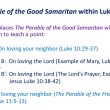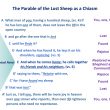Oh, how ambiguous ambiguity can be! “In my opinion, you will be fortunate if this person will work for you.” Tell me, what can this statement mean? The person is a hard worker. No, whoever can motivate him enough to work is lucky, for he is lazy! “Never did I eat such a cake!” The […]
Reformation 5: Romans 3:19-28: By Faith in Christ or by the Faithfulness of Christ
The Parables of Jesus, Lesson 6: The Parable of the Friend at Midnight and Its Lead-Up
Intro and Recap The setting for The Parable of the Good Samaritan was a lawyer wanting to justify himself, asking Jesus to tell him “what he needed to do to inherit eternal life” (Luke 10:25). So, if you are someone who thinks he must do something to have eternal life, then you must be the […]
Church History, Lesson 16: The Council of Nicaea and an Imperial Christianity
Recap and Intro In 318 AD, Arius, a Libyan-born pastor influenced by Origen, began teaching that Jesus was a creation of God who, at one time, did not exist. A deacon in Alexandria, Athanasius, became his primary opponent. Soon, the Greek-speaking Christian world became engulfed in this quarrel. This disunity disturbed Constantine. So, he convened […]
The Reformation, Five Centuries Later
By Pr. Rich Futrell One year passes and another begins, 500-hundred years’ worth since Luther tacked his 95 theses on Wittenberg’s wooden door. Through those statements, he wanted a debate about indulgences shortening someone’s time in Purgatory. Today, most don’t understand the fracas, which followed, fracturing Europe. On both sides, Lutheran and Roman-Catholic, people put […]
The Parables of Jesus: Lesson 5: The Good Samaritan: Luke 10:25-37
The Parable within Luke’s Gospel If we remember, we learned a chiasm is a rhetorical device where the author states an idea or ideas and then expresses them again in reverse order. The central point of a chiasm is its central idea. Within the flow of Luke, The Parable of the Good […]
Church History, Lesson 15: Christianity’s First Decade in Freedom
Recap and Intro In 311 AD, Emperor Galerius rescinded his persecution and allowed Christians to rebuild churches. His edict ended the effort to rid the Roman Empire of Christians. From the time of Irenaeus, around 200 AD, to 1000 AD, Christianity was primarily a religion in Asia and North Africa. Though in Italy, Gaul (France), […]
Reformation 3: Jeremiah 29:4-7, Romans 13:1-7, Matthew 22:15-22: The Two Kingdoms, Church and State
Human history is full of people not wanting to fund its government or services. Without both, a nation cannot endure. So, taxes are the costs a country incurs for its civilization. Still, most of us want the advantages of taxation but not the expenses. The first Israelite king recognized people’s distaste for taxes. A Philistine […]
The Parables of Jesus: Lesson 4: Loss and Restoration in Luke 15
The Setting for the Three Parables Read Luke 15:1-2 Eating with Sinners Part of Exodus 18:1 reads: “the Lord had brought Israel out of Egypt.” The Mekilta, Jewish scriptural interpretation, taught this for the verse: “Let no man associate with the wicked, not even to bring him close to the Law.” The Pharisees believed they […]
Church History, Lesson 14: The Rise of Monasticism
Recap and Intro When Valerian became Emperor in 257 AD, he began the first Empire-wide persecution of Christians. Cyprian, the Bishop of Carthage, was sent into exile. The next year, Valerian ordered all Christian clergy to be killed. So, Cyprian was brought out of exile and beheaded in Carthage on the 14th of September. The […]
Reformation 2: 2 Kings 5:1-3, 9-14; Romans 6:1-4; John 3:1-6, 16: Baptism
A Syrian commander, a well-respected military leader, who won the respect of his King. Still, something can come along in your life and undo much of what you built up over the years. Such is Naaman. For a fearsome affliction—leprosy—now overshadows his imposing warfighting skills and combat prowess. To protect others from the infectious contagion, […]




